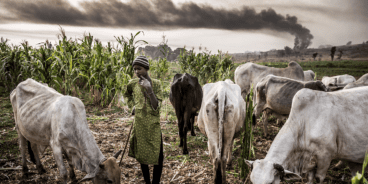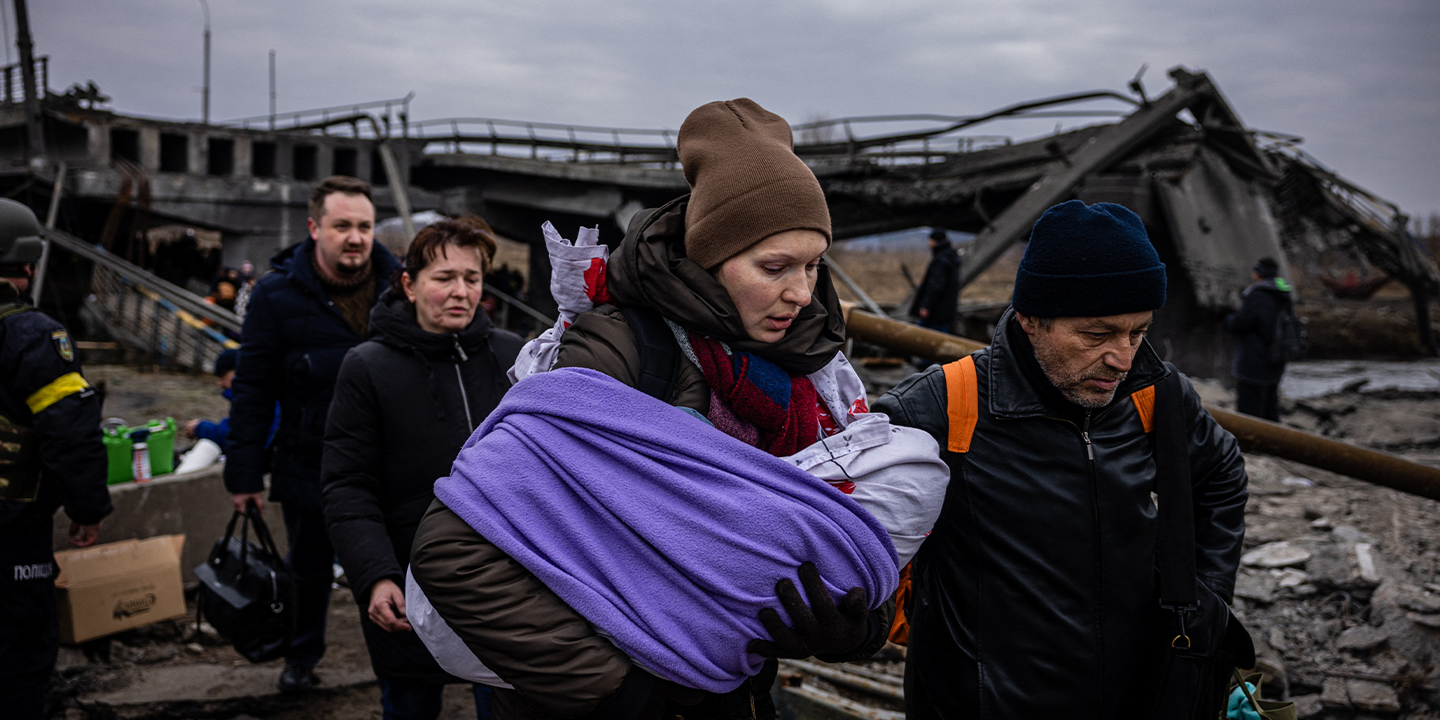

Atrocity Alert No. 383: Ukraine, Haiti and Ethiopia
Atrocity Alert is a weekly publication by the Global Centre for the Responsibility to Protect highlighting situations where populations are at risk of, or are enduring, mass atrocity crimes.
ATROCITIES ONGOING IN UKRAINE AS PROTRACTED WAR ENTERS ITS THIRD YEAR
This Saturday, 24 February, marks the second anniversary of Russia’s full-scale invasion of Ukraine. Since then, the conflict has been characterized by the wanton commission of possible war crimes and crimes against humanity against Ukraine’s population, who across the country continue to endure nightly bombardments by Russian forces. At least 10,378 civilians have been killed and 19,632 injured, although the actual numbers are likely thousands higher. While civilians in Ukrainian-held territory have borne the brunt of the death toll, civilians in Russian-occupied territory have also been killed and injured. Schools, healthcare, humanitarian workers and critical infrastructure, including power and water systems, have been routinely targeted, leaving 14.6 million people – 40 percent of Ukraine’s population – in need of humanitarian assistance. Over 10 million people have been displaced by the conflict, including over 6.3 million refugees. Despite the scale of the devastation caused by the conflict, the frontline has remained largely unchanged for the last year.
The UN Human Rights Monitoring Mission in Ukraine verified that at least 641 civilians were killed or injured in Ukraine during January 2024. The casualties mark a 37 percent increase since November, largely due to intensified aerial attacks by Russian forces. During an 18-hour assault on 29 December alone, Russian forces launched the largest aerial attack on Ukraine since the conflict began, with cruise and ballistic missiles striking cities across the country, killing at least 40 people and injuring 160 others. Attacks on civilians and civilian infrastructure are illegal under international law and may amount to war crimes and crimes against humanity.
Multiple rounds of peace talks early in the conflict yielded no long-term agreements, while progress toward ensuring justice for atrocities has remained difficult. On 14 September the International Criminal Court (ICC) opened an office in Kyiv – currently the Court’s largest field office – to assist Ukraine with the over 100,000 cases of war crimes under investigation. As of July only 50 Russian soldiers had been convicted of war crimes by Ukrainian courts, while the ICC has issued arrest warrants for Russian President Vladimir Putin and the Commissioner for Children’s Rights, Maria Alekseyevna Lvova-Belova, for their alleged responsibility for the deportation and transfer of population from occupied areas of Ukraine to Russia.
The Global Centre for the Responsibility to Protect’s Executive Director, Savita Pawnday, said, “While we have seen an unprecedented outpouring of support for Ukraine since the start of the conflict, two years on this support cannot falter. The international community must continue to increase pressure on Russia and its enablers to end the nightly barrage of missiles aimed at Ukrainian cities and civilians. We must continue to work diligently to secure the peace and justice the people of Ukraine deserve.”
UNRELENTING AND EXPANDING GANG VIOLENCE IN HAITI
Since early February gang violence has escalated and expanded across many neighborhoods in Port-au-Prince, Haiti, with devastating consequences for populations. All communes in the Port-au-Prince metropolitan area are affected, as gang members continue to clash for control of territory and perpetrate indiscriminate killings, kidnappings and sexual violence. In the past two weeks intense attacks have occurred in the communes of La Saline, Carrefour, Cité Soleil and Tabarre. The latest bout of violence forced nearly 10,000 people to flee their homes between 1-10 February, with many displaced families sleeping outside a police station in the hopes of safety.
Children are particularly impacted as violence ravages neighborhoods across Port-au-Prince. The UN Children’s Fund (UNICEF) has described playgrounds, schools and homes as “war zones,” with some neighborhoods having turned “into a living hell” for children. At least 167 boys and girls were killed or injured by bullets in 2023, while at least two children were fatally shot while fleeing violence during February. The Human Rights Service of the UN Integrated Office in Haiti has warned of a worrying trend of forcible recruitment of children, with gangs establishing checkpoints around schools. Gangs are also increasingly using sexual violence as a weapon against girls, directly targeting them, as well as women, to spread fear.
The unprecedented surge in violence has compounded an already dire humanitarian situation. Ongoing clashes have blocked cargo routes, restricted movement and resulted in school closures and aid groups suspending operations at health clinics and hospitals. The hospitals that remain open have been forced to evacuate patients, including newborns, due to fear of attacks. On 15 February the World Food Programme reported that the recent spike in violence has prevented the agency from reaching over 370,000 people in urgent need of food. This includes 56,000 people in Cité Soleil – a commune of the capital that has been facing intense and unrelenting gang violence and turf wars for years. The agency said interruptions in aid could push people in Cité Soleil into “catastrophe” levels of food insecurity, marked by famine-like conditions.
Bruno Maes, UNICEF Representative in Haiti, emphasized, “Despite the scale and severity of the crisis, the lack of attention to Haiti poses a daunting challenge. The cost of indifference and inaction is unconscionable.” As the situation continues to worsen for Haitians, the international community must take steps to address the crisis in a holistic way. This should include the urgent deployment of the Multinational Security Support Mission, implementing a coordinated humanitarian response and bolstering efforts to curb the flow of illicit weapons and ammunition to gangs in Haiti.
FEDERAL FORCES KILL DOZENS IN ETHIOPIA’S AMHARA REGION
According to the Ethiopian Human Rights Commission (EHRC), at least 66 people were extrajudicially executed in January during a string of attacks by Ethiopian federal forces in the Amhara region. The executions occurred in the context of fighting between the federal government and local Amhara militia known as “fano,” that has been ongoing since April 2023. In one of the deadliest incidents since the violence broke out, at least 45 people were killed, including a child and a pregnant woman, in the town of Merawi, East Gojjam Zone, on 29 January. Reports indicate that federal forces went house to house targeting civilians and accusing them of supporting the fano, who had previously occupied the town. Some witnesses said the attack was revenge for a fano assault earlier that day. The EHRC reported on other incidents in the same area, including a 19 January attack that killed 15 people in Berenta district and another on 15 January that killed six in Quarit district, which neighbors West Gojjam Zone.
These attacks are the latest in a series of abuses by the federal government in Amhara since April. In December between 30-40 people were killed by air and drone strikes in Amhara’s Sayint district. Ethiopian federal forces have also arrested, extrajudicially killed and summarily executed Amhara civilians in their search for fano supporters.
Since August 2023 the Amhara region has been under a federal government-imposed state of emergency. Marking the extension of the state of emergency on 6 February, Ethiopia’s Prime Minister Abiy Ahmed said that thousands of people arrested have been “re-educated and released.” Previous states of emergency under Prime Minister Abiy’s administration have resulted in human rights abuses, such as mass arrests and prolonged arbitrary detentions, including during the war in Ethiopia’s northern Tigray region from 2020-2022. Indiscriminate attacks on civilians, as well as the targeting of civilians based on their identity, extrajudicial executions and arbitrary detentions are prohibited under international law and may amount to war crimes and crimes against humanity.
In response to the EHRC’s report, the United States, European Union, United Kingdom and others called for transparent investigations into the killings and to hold those responsible to account. The Global Centre for the Responsibility to Protect’s Ethiopia expert, Sarah Hunter, said, “While calls for investigations and accountability are welcome, it would be remiss to forget that less than six months ago members of the UN Human Rights Council failed to renew the only international body doing that vital work. We continue to join victims and survivors in calling for an independent and transparent international accountability mechanism for all atrocity crimes in Ethiopia.”
Related Content


11th Meeting of the Global Network of R2P Focal Points Outcome Document
